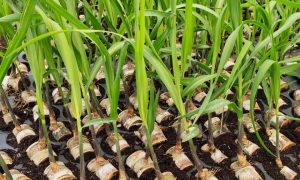Sugar industry optimistic that Budget 2025 will address key challenges and pave way for sustainable growth: Tarun Sawhney

Industry leaders in the sugar and ethanol sectors seek key measures in Union Budget 2025-26 to boost growth. They demand an MSP hike for sugar to ₹39.14/kg, subsidies for ethanol capacity expansion, and approval of the ethanol pricing bill. Calls for policy support, infrastructure development, and investments in biofuel innovation highlight the sector’s role in India’s energy transition.
As the Union Budget 2025-26 approaches, leaders from sugar, ethanol and allied industries have voiced their expectations for measures that can significantly boost the sector’s growth and sustainability.
Their focus revolves around addressing key challenges and pave the way for sustainable growth.
Tarun Sawhney, Vice Chairman & Managing Director of Triveni Engineering and Industries Ltd (TEIL) said, “The sugar industry is optimistic that Budget 2025 will address key challenges and pave the way for sustainable growth. A critical area of focus is the long-overdue revision of the Minimum Selling Price (MSP) for sugar, which has remained stagnant at Rs 31 per kg since 2019. Rising production costs and the increasing Fair and Remunerative Price (FRP) for sugarcane necessitate a revision to Rs 39.14 per kg. Such a move will not only stabilize the financial health of sugar mills but also ensure fair and consistent returns for farmers, creating a balanced and resilient ecosystem.”
“Equally important is advancing India’s ethanol blending goals, as the country approaches the E20 target by 2025. Achieving this milestone requires a robust roadmap, including continued policy support, technological innovation, and infrastructure expansion. Meeting the 20% blending target by 2025 will require approximately 1,016 crore liters of ethanol, rising to 1,350 crore liters when accounting for other uses. To meet this demand, ethanol production capacity must reach 1,700 crore liters by 2025. Targeted subsidies of INR 35,000 crore to create an additional 770 crore liters of production capacity will play a pivotal role. A key expectation from the government is the approval of the anticipated ethanol pricing bill, proposing an INR 4-5 per litre price hike for the Ethanol Supply Year 2024-25. This increase is essential to incentivize ethanol producers and distilleries to enhance production in alignment with India’s blending targets. Linking ethanol pricing to the FRP of sugarcane through a formula-based mechanism could further ensure stability for all stakeholders in the value chain,” he further added.
TEIL MD stressed that furthermore, to establish the roadmap beyond E20 targets, the government should focus on aligning blending targets with domestic feedstock availability and securing a steady supply chain, utilizing surplus FCI rice until maize production meets blending requirements. Additionally, it should prioritize the development of flex-fuel vehicles and expand dispensing infrastructure to support various ethanol-blended fuel options effectively.
“Investments in research and development are also crucial in ensuring India remains a global leader in biofuel innovation. Breakthroughs in 2G ethanol, Sustainable Aviation Fuels (SAF), and ethanol-to-hydrogen conversion technologies will keep India at the cutting edge of the biofuel sector. In parallel, India’s commitment to achieving net-zero carbon emissions by 2070 underscores the need for significant investment in renewable energy,” he concluded.
Vasu Naren, Chairman & Managing Director of Sona Machinery highlighted the potential of integrating rice milling by-products like rice husk into ethanol production, aligning the sector with India’s ethanol blending goals.
He said “These measures will not only modernize the rice milling sector but also position it as a critical enabler of India’s ethanol blending targets and sustainable energy transition. Policy support for rice milling and ethanol production will boost rural livelihoods, strengthen the agricultural economy, and solidify India’s position in global agriculture and biofuel markets.”
To read more about Sugar Industry continue reading Agriinsite.com
Source : Chinimandi














